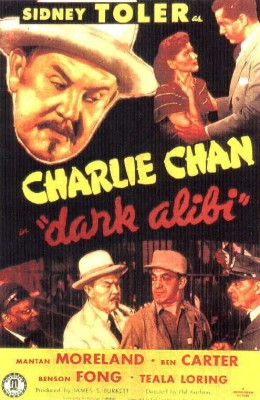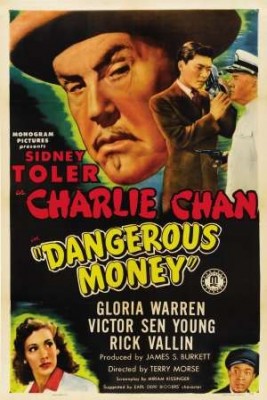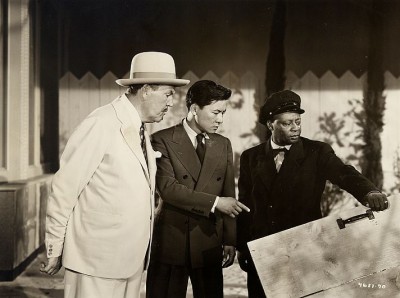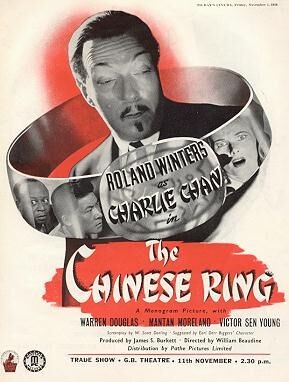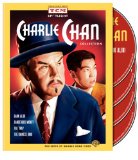| Reviews & Columns |
|
Reviews DVD TV on DVD Blu-ray 4K UHD International DVDs In Theaters Reviews by Studio Video Games Features Collector Series DVDs Easter Egg Database Interviews DVD Talk Radio Feature Articles Columns Anime Talk DVD Savant Horror DVDs The M.O.D. Squad Art House HD Talk Silent DVD
|
DVD Talk Forum |
|
|
| Resources |
|
DVD Price Search Customer Service #'s RCE Info Links |
|
Columns
|
|
|
TCM Spotlight: Charlie Chan Collection (Dark Alibi / Dangerous Money / The Trap / The Chinese Ring)
By 1946 the series was pretty much in the toilet. There were two main reasons for this: first was the loss of Warner Oland when the actor died in 1938; Sidney Toler took over the role, and while he's technically fine, he had none of Oland's humanity, warmth, and sense of humor. Toler delivers the same basic dialogue in a similar manner but for whatever reason tends to come of as stiff and even slightly petulant toward others, instead of gently humorous and self-deprecating in the Oland manner.
The other reason was that in the early 1940s 20th Century-Fox decided to stop making Charlie Chan movies and Toler, wanting to continue in the role, acquired the movie rights and took the series to Monogram, a Poverty Row studio. According to one source, the budgets dropped from $200,000 per Fox film to just $75,000 at Monogram, which sounds about right. Not only are these films cheap - most tend to concentrate themselves at a single, drab location, usually a featureless house - the Monogram Chans have much less interesting casts, are starving for a lack of atmosphere, and are poorly written.
The single advantage of the Monogram entries over the Fox films is contract player Mantan Moreland, who appears in most of the later films as Chan's chauffer, Birmingham Brown. Under contract to the studio, the African-American comedian livened up many a Monogram cheapie with his excellent comic timing. Later, during the Civil Rights era of the 1960s, such performances were universally regarded as perpetuating negative racial stereotypes. Only in recent years have critics come to realize that their well-meaning outrage actually was doing these talented performers a great disservice, that they in fact transcended limited stock parts turning them into memorable, entertaining characterizations. Funny is funny, and Moreland was an incredibly funny man, period.
"Accidents can happen, if planned that way."
Dark Alibi has a running time of just under 62 minutes, but seems a good 40 minutes longer. At a boarding house belonging to social worker Mrs. Foss (Edna Holland*), distinguished Thomas Harley (Edward Earle), who lives with his pretty adult daughter, June (Teala Loring), is revealed as an ex-con, having served time 15 years earlier. Moreover, he's arrested for a bank robbery during which a guard was killed. Harley is convicted and sentenced to death.
With her father scheduled to be executed in just nine days, June and her prison guard boyfriend, Hugh Kensey (George Holmes), convince Charlie Chan (Sidney Toler) to take the case. Chan questions Mrs. Foss and the other boarders, including typist Miss Petrie (Janet Shaw); Johnson (Milton Parsons, taking a break from his usual undertaker roles), a bookkeeper at a theatrical agency; Danvers (Ray Walker), a wise guy bank alarm system salesman; and Emily Evans, a - ahem! - "dancer."
Other clues suggest Harley's former prison warden, Cameron (Russell Hicks, who played an older Robin Hood that same year), may be the puppet master behind all the robberies. With the aid (or rather, despite the interference) of Number Three Son Tommy Chan (Benson Fong) and chauffer Birmingham Brown (Mantan Moreland), Charlie Chan is on the case!
Dull, dull, dull. As with most of these later Chans, Moreland's clowning provides Dark Alibi's only bright moments. For the second and last time, Moreland shares scenes with another African-American performer, Ben Carter, as Birmingham's convict brother Benjamin. As in The Scarlet Clue (available on MGM's Charlie Chanthology) the two engage in a very funny "incomplete sentences" routine, catching up on the latest gossip in a kind of shorthand that bewilders onlookers like Tommy. It's a classic comedy routine the pair toured with in Vaudeville and which is still quite funny today.
Sadly, the rest of the film has little to offer. Perhaps reflecting the postwar trend away from cheap mysteries, these later Monogram Chans appear marginally less cheap than those made during the last two years of the war. At least this one offers more varied locations, extras in the background, and real exteriors, elements generally avoided in the first Monogram batch.
Ship's Captain: "This cruise is like a nightmare!"
Charlie Chan: "But not a boring one."
Speak for yourself, Charlie. Dangerous Money is another journey into Dullsville, albeit with more brooding atmosphere than Dark Alibi. Missing is Mantan Moreland, his pole position in this C-mystery taken by Willie "Sleep 'n' Eat" Best as Chattanooga Brown, a role he first played in The Red Dragon (1945). At the conclusion of the 1932 film The Monster Walks, the film's hero points to a big ape caged nearby, explaining to Willie Best's character that man descended from apes. Hearing this Best replies, "Well, I had an uncle who looked like that, but he was a lot slower." Ouch! In Dangerous Money, Best at least speaks in a normal voice and generally avoids a similarly painful racial stereotype. Just barely.
Also for this entry Victor Sen Yung is back as Number Two son Jimmy Chan, a role Yung played in the nine Toler entries at 20th Century-Fox, as well as Monogram's Shadows Over Chinatown (1946). Otherwise, it's the same old same-old. The picture was traffic-copped by editor Terry Morse, best known for his direction of the Americanized Godzilla, King of the Monsters! (1956). Dangerous Money's cutter was Richard Currier, who for many years edited the Our Gang and Laurel & Hardy shorts. Unfortunately, neither brings any life to this lifeless movie. Though only 66 minutes long, I fell asleep twice while trying to watch it.
Aboard the cruise ship Newcastle, an undercover government agent, Scott Pearson (Tristram Coffin, future King of the Rocketmen) is knifed just as he's filling Charlie Chan in on the details of his investigation, something to do with money and valuable works of art stolen from the Philippines during the war. Suspects include ichthyologist Henry Martin (Emmett Vogan) and his wife, Cynthia (Elaine Lange); professional knife-thrower Freddie Kirk (John Harmon); cotton goods trader P.T. Burke (Dick Elliot); Polynesian restaurateurs Tao and Laura Erickson (Rick Vallin and Amira Moustafa); and ship's cook Big Ben (Dudley "This house has sho' gone crazy!" Dickerson).
To its slight credit, the fog-swept deck scenes and (soundstage) south seas island locations generate some atmosphere reminiscent of Charlie Chan's Murder Cruise (1940) but the film is otherwise extremely minor.
Perhaps the best example of the lack of care that went into these later films, a carelessness bordering on contempt for its audience, is one brief shot of ichthyologist Henry Martin engrossed in his studies. He's reading a thick book with a dust jacket that makes no attempt to be realistic. There's no picture of the author, nothing on the spine, just a single word in block letters on its front cover: "FISH."
"Best laid plans of mice and men sometimes go a little bit haywire."
In Sidney Toler's case, whatever plans he might have had to improve the Monogram films must have seemed trivial compared to more personal and tragic problems. His first wife died in 1943, and though Toler remarried, three years later he was diagnosed with terminal intestinal cancer. Reportedly the 72-year-old actor suffered mightily during the productions of Dangerous Money and The Trap, with pain so great that he could hardly walk, but if that's true it's never apparent in the films, except maybe for one scene. At the climax of The Trap there's a rather slow-speed car chase. As Jimmy Chan (Victor Sen Yung) and Birmingham Brown (Mantan Moreland) scramble to get into their car and chase after the murderer, Toler's Chan leisurely strolls, as if preparing for a Sunday drive in the country. Otherwise, he's still the same old inscrutable (Toler-version) Chan.
The movie is a bit livelier than the previous two films and its story very slightly more interesting. Cole King's (Howard Negley, who tends to whimper like the Cowardly Lion) variety troupe, possibly Production Code-ese for burlesque strippers, along with press agent Rick Daniels (Larry J. Blake) and Mrs. Thorn (Lois Austin), the wardrobe mistress, arrive at a Malibu beach house maintained by hatchet-faced Miss Weebles (Minerva Urecal). When universally despised headliner Marcia (Anne Nagel) threatens to expose showgirl Adelaide's (Tanis Chandler) secret marriage to disgraced physician George Brandt (Walden Boyle), the star of the show blackmails another showgirl, Lois (Jan Bryant) to steal some of Adelaide's secret letters.
However, Lois is strangled by a mysterious figure and soon thereafter Marcia herself turns up dead, apparently washed up on shore. A "Chinese girl" (as everyone calls her), San Toy (Barbara Jean Wong), a friend of Jimmy's sends for Charlie Chan while motorcycle cop Sgt. Reynolds (Kirk Alyn, star of the Superman serials) is also on the case.
There are a few, very modest advantages over the other two Tolers. Instead of restricting the action to cramped studio interiors/exteriors, The Trap actually has a fair amount of location work, including a stretch of the Pacific Coast Highway (then called the Roosevelt Highway) in Malibu, including some opening shots filmed around the Malibu Inn. A lot of footage cuts between a soundstage exterior of sand and cabañas which contrasts the real sand and surf. The principals appear in the Malibu exteriors, including poor Toler who uncomfortably climbs over the hot, uneven sand.
Directed by B-Western veteran Howard Bretherton, The Trap also generates a bit more atmosphere; the murders are actually staged pretty effectively while the underscoring, often inapt in Monogram movies when not inept, is closer in spirit to Universal's 'Sherlock Holmes' series. The story, though as usual wildly overloaded with red herrings, is somewhat more coherent and interesting, though the picture is still awfully uneventful.
Sidney Toler died on February 12, 1947, almost six months to the day after completing The Trap, his last film. But the series would continue without him, and why not? Similar to other entries, its opening titles read, "Monogram Presents Charlie Chan in 'The Trap'...Starring Sidney Toler." Toler's character got better billing than the actor playing him! Good gracious me!
Like Toler, Roland Winters was a familiar character actor, though hardly a character star as Warner Oland had been prior to playing Chan. At 44, he was by far the youngest of the three actors; maybe Monogram wanted to make sure he'd be around a while. Number One Son Keye Luke, absent since the Oland days, returned to the series near the very end of its run; Luke was actually a few months older than Winters.
Though fine in other roles, including playing Elvis's pop in Blue Hawaii, physically he's all wrong as Charlie Chan. While neither Swede Oland nor Scottish-American Toler looked particularly Chinese, they were at least able to suggest a (now dated) general Asian exoticness. Winters suggests a small town American barber. With his pale blue eyes and notably long, narrow nose, his features are almost the antithesis of the average Chinese man. (The costuming here, dominated by a tan tweed suit, doesn't help.)
Winters's performance, at least in this first outing, The Chinese Ring, is undistinguished. Neither as outwardly placid/inwardly cunning in the Oland manner nor polite to strangers/petulant toward relatives and servants as was Toler, Winters here comes off as extremely ordinary. He projects none of Chan's cunning, understated control, astute observational skills, warmth - nothing. In this mystery Chan comes off more as a spectator than master sleuth.
After writing everything from Frankenstein movies to Sherlock Holmes mysteries to Laurel and Hardy comedies, Scott Darling returned untriumphantly to Monogram to write this, obviously cribbing from his equally lackluster "Mr. Wong" screenplays of the late-1930s. Very much like that series, it's structured equally around the movements of its main detective, Chan, short-tempered police Sergeant Davidson (Warren Douglas), and his wisecracking reporter-girlfriend (Louise Currie, whose varied career included Citizen Kane and Monogram's The Ape Man with Bela Lugosi). Chan and Davidson are particularly inept investigators: when they find the air gun that killed the princess and her maid (Barbara Jean Wong), they immediately smudge their grubby fingerprints all over the murder weapon.
The story, about a Chinese princess murdered for the million bucks she brought over to buy airplanes for her country, is uninvolving. However, the cast of suspects is slightly above average for a Monogram film, with ship's captain Kong (Philip Ahn), banker Armstrong (Byron Foulger), and aircraft manufacturer Kelso (Thayer Roberts) more entertaining than usual.
Video & Audio
Considering that for years the vast majority of Monogram movies have been seen only as battered 16mm TV prints or murky, barely watchable public domain videos, this Charlie Chan Collection is a revelation. Despite bits here and there where Warner Bros. had to resort to secondary sources, mostly all four films look incredibly good. The Trap has one reel that's pretty scratched up (and weirdly angled at about 20 degrees) and a few seconds here and there of grainy footage. All have window-boxed opening titles. The four films are presented on four single-sided discs, a luxury considering they easily could have crammed the whole shebang onto a single DVD. The attractive gatefold packaging is another plus. The mono English audio is adequate and SDH subtitles are included. There are no Extra Features
Parting Thoughts
Sometimes B-movies with bad reputations can turn out to be surprisingly good. Fox's later Laurel & Hardys, for instance, weren't nearly as bad as fans had been led to believe. But these Chans surely live down to their reputations. Though the four average about 65 minutes apiece, watching them I fell into a deep sleep a grand total of six times, including once in the middle of the afternoon, not a good sign. But I'm still glad I saw them, grueling though it often was, and the transfers are excellent. Rent It.
* Opening titles credit Minerva Urecal in the cast, but she's not in the film. Edna Holland instead essayed the part she was to have played.
Stuart Galbraith IV's latest audio commentary, for AnimEigo's Musashi Miyamoto DVD boxed set, is on sale now.
|
| Popular Reviews |
| Sponsored Links |
|
|
| Sponsored Links |
|
|
| Release List | Reviews | Shop | Newsletter | Forum | DVD Giveaways | Blu-Ray | Advertise |
|
Copyright 2024 DVDTalk.com All Rights Reserved. Legal Info, Privacy Policy, Terms of Use,
Manage Preferences,
Your Privacy Choices | |||||||









